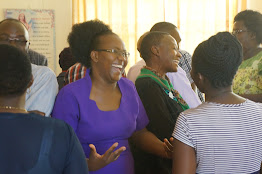When you turn your thoughts into actions, then the results are new experiences.
Some of you are already in full swing. Others might experience the same challenges as other participants in earlier courses have formulated at the beginning of this phase:
“There is a risk of “loss of enthusiasm if it does not go well in the 1st few weeks”
“There might be challenges in time management, since many of the deep learning techniques require time”
“It is a challenge to find time for collaboration with colleagues and dissemination of the knowledge gained here to colleagues”
“The different nature of the courses I teach might require other teaching techniques”
“Facilitators need to keep in touch with participants to remind them of their roles. Participants tend to be busy when they get back to work”
It is urgent to overcome such challenges. One of the ways is to make many small changes of your thinking:
Make a note to yourself before teaching a class, tutoring a student, and even before meetings: What is the intended learning outcome of this session?
… and add a reflective sentence or two right after.
The same goes for “The basic of Planning for Teaching. Six important steps in any teaching process”.
If you can’t find time to do all the considerations proposed in “The basics of Planning for Teaching: Six important steps in any teaching process”? http://teachglobalcitizenship.blogspot.com/2018/06/basics-of-planning-teaching.html
... then choose your focus, plan and try ...
E.g.
Tomorrow I will try to build a bridge to student´s preunderstanding
Tomorrow I will try a new hook
Tomorrow I will use several kinds of questions such as ...
Tomorrow I will use the white-board to help my students organise their notes instead of getting my notes
Tomorrow I will teach in chunks of 20 minutes, and ask all students in the lecture theatre to sum up in pairs, to answer questions and guess the conclusions in the next “chunk”
Tomorrow I will ...
... AND make a written note when you plan, AND add a reflective sentence or two right after (or some other time on the SAME day as your class).
If you already are in the middle of coping with bigger challenges (overhaul of whole courses, preparing training of your colleagues, ...): CONGRATULATIONS!
OUR POINTS ARE …
1. You don´t need extra time in order TO BECOME AN EXPERIMENTING TEACHER,
YOU JUST HAVE TO USE YOUR TIME DIFFERENTLY, AND ASK YOURSELF EVERY DAY:
How do I do the usual with a little twist, ... in such a way that the students and I experiment a little, and I get a new experience (which will be a stepping stone leading me to the next action)
2. IT IS ESSENTIAL FOR YOUR OWN DEVELOPMENT AS A REFLECTING TEACHER THAT YOU KEEP A RECORD OF YOUR EXPERIMENTAL STEPS, AND WHAT CAME OUT OF IT:
It makes it possible to build development as a step-by-step journey.
And you will (after doing this for a while) be able to get a helicopter view of your journey and reflect on what to conclude and what to do next in your professional life.
Start WRITING “MY PROFESSIONAL EVALUATION NOTES” in a notebook, on your PC or your phone (just choose your own way)
Here is an example of my own version of “MY PROFESSIONAL EVALUATION NOTES”:
My example is from the last day of our intro-course:
The session on “Student questionnaire that demands reflections”
My planning considerations: I have chosen to show the participants a student questionnaire because it is a good example of many reflective questions. Click I asked myself when I was planning: How can I make every participant reflect on what questions create the most important student reflection? I chose to plan a small role-play/simulation of a staff meeting where each colleague is demanded to recommended one question (and answer “WHY”). A participant is asked to lead the meeting and conclude. My intention is, too, that everyone experience to take part in a simulation, and will be able to do role-plays/simulations afterwards. My notes after the session: The participants did very well: Engaged and well argued responses from everyone. The appointed group leader did well even though I should have given him clearer instructions. My conclusion is that this session was a good beginning on this topic. However, a follow-up is needed, a good training task would be that each participant made a short questionnaire for students in one of his/her own classes. (Maybe as part of the follow-up course we hope to implement in the beginning of 2019). The use of role-plays/simulations has to be deepened, too (theoretically as well as practically). |
Last words:
A short recap: Why do we ask you to do notes like this: We want to push everyone to start writing your own version of “MY PROFESSIONAL EVALUATION NOTES”
Evaluation Template: My professional Evaluation Notes Click
Here is an overview of all pages in this blog:
Click here to jump to anywhere in this blog:
Keep ON going - Teach better by use of evaluation and action plans
A warm welcome to all teachers at highshool, college and university-levels Click Evaluate your own courses + Inspirational active learning methods handouts Click Take small steps every day Click Planning of deeper learning Click Focus on the theoretical framework: "You need a framework …” Click Evaluate your courses together with your students 5 steps to turn inspiration into action & plan a MIDWAY EVALUATION in your courses Click Inspiration for how to develop better homework results Click Inspiration for your next steps: What to learn from your students Click Evaluate together with a colleague/colleagues , … and train your colleagues Click Inspiration for your next steps Click Sources and references Click (Furthermore, LNKS to 30 inspirational documents are to be found in these blog posts) |




























